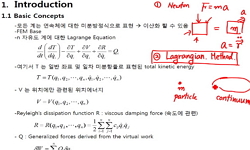This paper described the free vibration characteristics of Optimized H Type (OHT) spacer grids (SG) supporting the PWR fuel rod. The vibration test and the finite element (FE) analysis are performed under the free boundary condition and the clamped at...
http://chineseinput.net/에서 pinyin(병음)방식으로 중국어를 변환할 수 있습니다.
변환된 중국어를 복사하여 사용하시면 됩니다.
- 中文 을 입력하시려면 zhongwen을 입력하시고 space를누르시면됩니다.
- 北京 을 입력하시려면 beijing을 입력하시고 space를 누르시면 됩니다.
https://www.riss.kr/link?id=A100172493
- 저자
- 발행기관
- 학술지명
- 권호사항
-
발행연도
2004
-
작성언어
Korean
-
주제어
가압경수로 ; 고유진동수 ; 모드형상 ; 연료봉 ; 지지격자 ; 최적화 H형 ; Fuel Rod ; Mode Shape ; Natural Frequency ; Optimized H Type ; PWR ; Spacer Grid
-
KDC
424
-
등재정보
KCI등재
-
자료형태
학술저널
-
수록면
512-519(8쪽)
- 제공처
- 소장기관
-
0
상세조회 -
0
다운로드
부가정보
다국어 초록 (Multilingual Abstract)
This paper described the free vibration characteristics of Optimized H Type (OHT) spacer grids (SG) supporting the PWR fuel rod. The vibration test and the finite element (FE) analysis are performed under the free boundary condition and the clamped at two points (or three points) in the bottom which is the same one as the experimental condition for the dummy rod continuously supported by spacer grids. A modal test is conducted by the impulse excitation method using an impulse hammer and an accelerometer, and the TDAS module of the I-DEAS software is used to acquire and analyze the sensor signals. The softwares related to the FE analysis are the I-DEAS for the geometrical shape modeling and meshing, and the ABAQUS for solving. The fundamental frequency of the OHT SG by experiment under a clamped condition at two points is 175.18 Hz, and shows a bending mode. We think there is no resonance between the fuel rod and the SG because the SG's frequency is higher than that of the fuel rod existing in the range from 30 to 120 Hz. The fundamental frequency of the SG under the free boundary condition is 349.2 Hz showing a bending mode, and the results between the test and the analysis have a good agreement with maximum 7 % in error It is also found that the FE analysis model of the OHT SGs to analyze an impact, a buckling and vibration et al. has been generated with reliability.
동일학술지(권/호) 다른 논문
-
아날로그 회로와 마이크로 프로세서를 이용한 PPF 제어기의 구현
- 한국소음진동공학회
- 김기영
- 2004
- KCI등재
-
베어링 지지댐퍼 강성의 비대칭이 회전체 동특성에 미치는 영향
- 한국소음진동공학회
- 제양규
- 2004
- KCI등재
-
- 한국소음진동공학회
- 이종석
- 2004
- KCI등재
-
- 한국소음진동공학회
- 하동진
- 2004
- KCI등재





 ScienceON
ScienceON DBpia
DBpia




